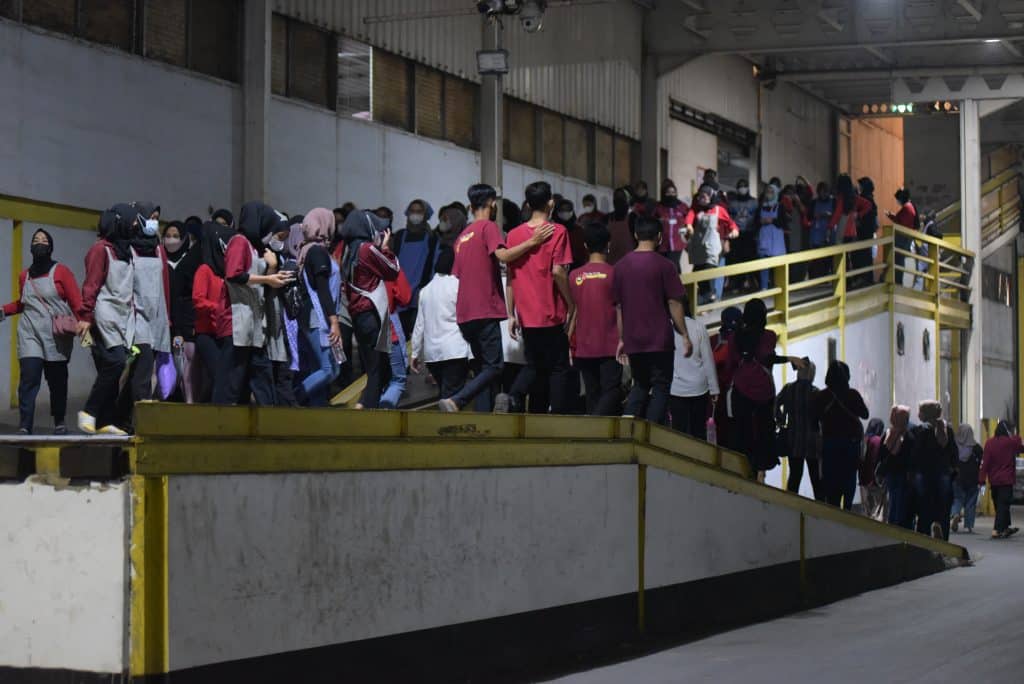MAJALENGKA, Indonesia – During a warm Friday morning on November 22, 2022, a sea of around 800 workers stood in protest at the company’s gate in Majalengka, West Java. Dadang (not his real name), a trade unionist, was on top of a van, exclaiming through a megaphone, expressing the collective sentiment of unfulfilled rights and unaddressed harassment that had troubled the factory’s workers.
He has been the chairperson of the trade union at his workplace – a garment factory – for the last two years. Since then, Dadang, alongside fellow union members, has navigated various trials and tribulations to uphold workers’ rights. He strengthens the bond of solidarity among 3,000 workers within the company by facilitating dialogue between the factory and the workers. This “social dialogue” allows both parties to express their perspectives and issue their grievances. Sometimes, however, despite best efforts, agreements aren’t able to be reached.
“The protest is something we must do. We have already undergone non-litigation methods such as bipartite discussions, but to no avail. So, we have the right to conduct a public protest,” Dadang said.
Dadang said the company initially did not implement the salary increase as stipulated in West Java Gubernatorial Decree No. 561/2021, which states that workers in West Java companies who have worked for at least one year will receive a salary increase between 3.27% and 5% of the minimum wage set for their area in 2022.
Meanwhile, the employer’s association has filed a lawsuit against West Java Governor Ridwan Kamil to cancel the salary increase decision made through the decree. Both the employers and the trade unions are currently awaiting the official announcement from the government to decide on the next steps.
Dadang also recounted instances of alleged verbal abuse by one of the heads of the factory’s sections towards his subordinates. The union also believed that the company should fulfil the right to be provided a minimum of 1,400 calories during overtime, as stipulated in existing regulations.

In the aftermath of the protest that Dadang led, the union and factory management called on Better Work Indonesia’s facilitation to find a better path forward. Jati, the labour union’s vice chairperson, together with factory’s management, met with a Better Work enterprise advisor to plan how to avoid future process and instead negotiate through the social dialogue process.
“We want to build our company better. That’s why I highly appreciate the presence of Better Work Indonesia,” Jati said. He particularly appreciated Better Work Indonesia’s communication. With good communication, Jati explained that labour unions can identify problems and search for solutions collaboratively.
Factory management also valued the support. Human Resources (HR) Manager of the factory Asih (not her real name) also stated that the Better Work Indonesia representative had toured the factory to engage with the union secretariats. She provided counselling and education on correct industrial relations practices.
“During the dispute, [the Better Work Indonesia representative] approached the unions persuasively, engaging in heartfelt conversations and being gentle in the approach,” Asih said.
Through ongoing discussions, the factory managed to secure provisions for food during overtime, address verbal abuse, and await official announcements regarding the minimum wage increase. The company also hired Budi (not his real name) a seasoned Industrial Relations (IR) expert, to streamline communications and help address concerns between workers and management.
As the factory makes progress, Dadang hopes that other companies in Indonesia can also take action to prevent anti-union behaviours and the resultant fallout. This has become important amid the decline of unionization rates in many countries, according to a 2019 International Labour Organization (ILO) report.
“The workers’ union does not seek to harm the company- no, that’s not our intention. As a workers’ union, we can be partners, as we all share a common interest in the success of the company,” said Dadang.
This factory is not an outlier: Better Work Indonesia supported both employers and unions in at least 21 industrial disputes in 2022. Better Work Indonesia Operations and Stakeholder Engagement Manager Nenden Aminah stated that enterprise advisors continue to encourage management, workers, and union representatives to engage in dialogue, and then to follow the national dispute mechanism when bipartite negotiation fails to reach an agreement.
“Better Work Indonesia continues to bring information from the factory level union to the attention of the trade unions (confederation and branch level) as well as to the Ministry of Manpower – and coordinates with all for the remediation of challenging situations,” said Nenden.
More information on how Better Work promotes strong industrial relations and the impact on both workers and management can be found in the 2022 report, “The Impact of Better Work Indonesia: a 10 year reflection”.